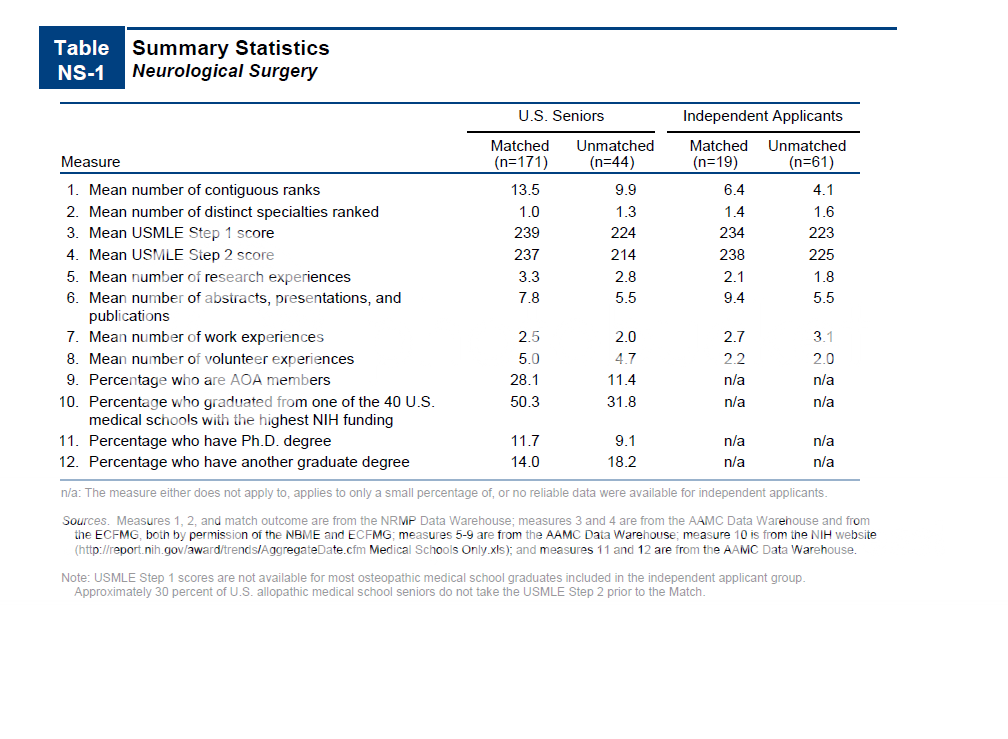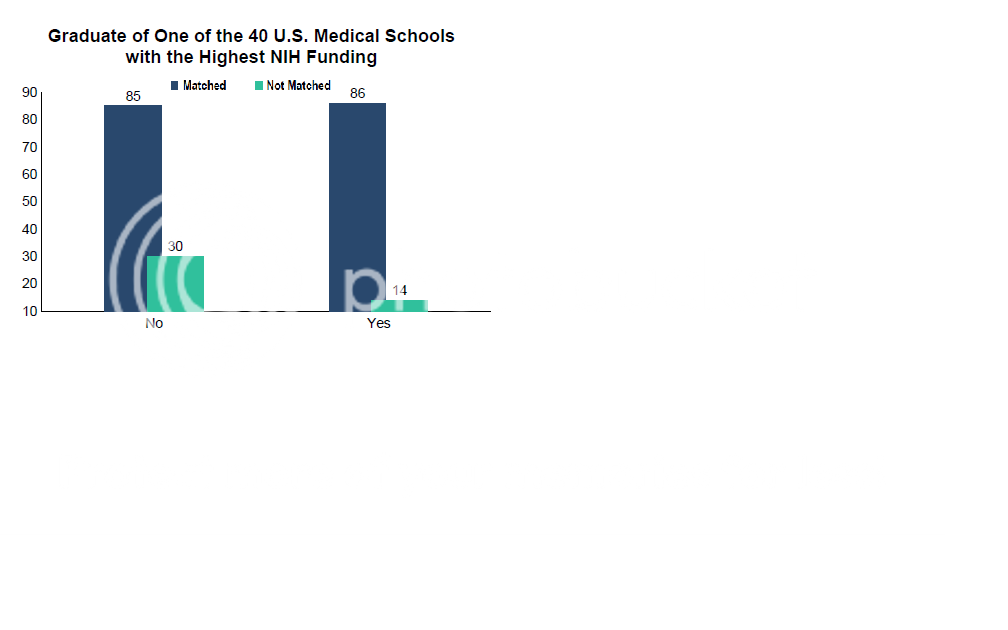You seem to be very agitated by the data. I wonder why?
I'm not agitated. I know that it doesn't matter what school you go to, if you come out with a GPA >3.75 and a good board score, you control your own destiny.
This thread makes it sound like the only way to match neurosurgery is to go to a top 10 program. Since I'm in a ~40ish program, and we match 2-3 neurosurgery/year, I like to call a foul when I see it. Even then, Mercer SOM matched 2 Neurosurgery guys two years ago. They are almost dead last in the US news ranking.
Medical school isn't undergrad. For the most part, every medical school in the US is damn fine, and if the student works hard, they control their own destiny.
Here's the match list from last year. As you can see, the only way to get into an "competitive" specialty is to go to Harvard. The match was 2008. In 2009, we had 19 diagnostic radiology matches.
t. Vincents Hospital-New York, NY Anesthesiology
U Texas SW Med School-Dallas, TX Anesthesiology
Baylor College of Med-Houston, TX Anesthesiology
U Texas Med Sch-Houston, TX Anesthesiology
U Louisville SOM-KY Anesthesiology
Emory Univ SOM-Atlanta, GA Anesthesiology
U Tenn Grad SOM-Knoxville, TN Anesthesiology
Mayo School of Grad -Jacksonville, FL Anesthesiology
Virginia Mason Med Ctr-Seattle, WA Anesthesiology
U Texas SW Med Sch-Dallas, TX Anesthesiology
Wake Forest Baptist -Winston-Salem, NC Anesthesiology
Vanderbilt Univ Med Ctr-Nashville, TN Anesthesiology
Emory Univ SOM-Atlanta, GA Anesthesiology
Ochsner Clinic Foundation-New Orleans, LA Anesthesiology
U Alabama Med Ctr-Birmingham, AL Anesthesiology
Uof Arkansas, COM-Little Rock, ARK Anesthesiology
Johns Hopkins Hosp-Baltimore, MD Anesthesiology/Mercy
Emory Univ SOM-Atlanta, GA Anesthesiology-Prelim
Univ of Pittsburgh-Pittsburgh, PA Child Neurology
St Louis Univ SOM-MO Dermatology
U Illinois COM-Chicago, IL Emergency Medicine
U Illinois COM-Chicago, IL Emergency Medicine
Hershey Med Ctr/Penn State-Hershey, PA Emergency Medicine
NY Methodist Hospital-Brooklyn, NY Emergency Medicine
Michigan State University Hospital-Lansing, MI Emergency Medicine
Medical College of Georgia-Augusta, GA Emergency Medicine
NYP Hosp-Columbia & Cornell-New York, NY Emergency Medicine
U of Florida COM-Shands-Gainesville, FL Emergency Medicine
Morristown Mem Hosp-Morristown, NJ Emergency Medicine
U Tennessee COM-Chattanooga, TN Emergency Medicine
Indiana Univ Sch Of Med-Indianapolis, IN Emergency Medicine
U Massachusetts Med School-Worcester, MA Emergency Medicine
U of Florida COM-Shands Gainesville, FL Emergency Medicine
U North Carolina Hospitals-Chapel Hill, NC Emergency Medicine
U of Florida COM-Shands -Gainesville, FL Emergency Medicine
LSUHSC-Shreveport-Shreveport, LA Emergency Medicine
East Tennessee St Univ-Johnson City, TN Family Med/Kingsport
Spartanburg Reg Healthcare-Spartanburg, SC Family Medicine
Riverside Methodist-Columbus, OH Family Medicine
Moses H. Cone Mem Hosp-Greensboro, NC Family Medicine
Anderson Area Med Lakes-Anderson, SC Family Medicine
Mayo School of Grad -Jacksonville, FL Family Medicine
Wake Forest Baptist -Winston-Salem, NC Family Medicine
Palmetto Health Richland-Columbia, SC Family Medicine
Self Regional Healthcare-Greenwood, SC Family Medicine
Self Regional Healthcare-Greenwood, SC Family Medicine
Contra Costa Reg Med Ctr-Martinez, CA Family Medicine
Palmetto Health Richland-Columbia, SC Family Medicine
Self Regional Healthcare-Greenwood, SC Family Medicine
Beth Israel Med Ctr-New York, NY General Surgery
U of Florida COM-Shands -Gainesville, FL General Surgery
Carilion Clinic-Roanoke, VA General Surgery
Atlanta Med Ctr-Atlanta, GA General Surgery
Spartanburg Reg Healthcare-Spartanburg, SC General Surgery
Baylor U Med Ctr-Dallas-TX General Surgery
Medical College of Georgia-Augusta, GA General Surgery
Staten Island U Hosp-Staten Island, NY General Surgery
U Illinois COM-Chicago, IL Internal Medicine
Wake Forest Baptist Med -Winston Salem, NC Internal Medicine
Medical College of Georgia-Augusta, GA Internal Medicine
Boston Univ Med Center-Boston, MA Internal Medicine
Medical College of Georgia-Augusta, GA Internal Medicine
Temple University Hospital - Philadelphia, PA Internal Medicine
U of Florida COM-Shands Gainesville, FL Internal Medicine
Medical College of Georgia-Augusta, GA Internal Medicine
Wake Forest Baptist-Winston-Salem, NC Internal Medicine
U Kentucky Med Ctr-, KY-Lexington, KY Internal Medicine
Medical College of Georgia-Augusta, GA Internal Medicine
Emory Univ SOM-Atlanta, GA Internal Medicine
U Kentucky Med Ctr-Lexington, KY Internal Medicine
Mayo School of Grad Med Educ-, FL Internal Medicine
Medical College of Georgia-Augusta, GA Internal Medicine
Medical College of Georgia-Augusta, GA Internal Medicine
UC San Diego Med Ctr-San Diego, CA Internal Medicine
Medical College of Georgia-Augusta, GA Internal Medicine
Naval Medical Center-Portsmouth, VA Internal Medicine
Temple University Hospital - Philadelphia, PA Internal Medicine
Medical College of Georgia-Augusta, GA Internal Medicine
Hosp of the Univ of PA-Philadelphia, PA Internal Medicine
Emory Univ SOM-Atlanta, GA Internal Medicine
UMDNJ-R W Johnson-New Brunswick, NJ Internal Medicine
Medical College of Georgia-Augusta, GA Internal Medicine
University of WA SOM-Seattle, WA Internal Medicine
Baylor College of Med-Houston, TX Internal Medicine
Virginia Commonwealth U Hlth , VA Internal Medicine
Medical University of SC-Charleston, SC Internal Medicine
U Alabama Med Ctr-Birmingham, AL Internal Medicine
Loyola Univ Med Ctr-Maywood, IL Internal Medicine
Palmetto Health Richland-Columbia, SC Internal Medicine
Greenville Hosp Sys/Univ -Greenville, SC Medicine-Pediatrics
Greenville Hosp Sys/Univ Greenville, SC Medicine-Pediatrics
East Tennessee St Univ-Johnson City, TN Medicine-Psychiatry
Duke Univ Med Ctr-Durham, NC Med-Prelim/Neurology
University Hosps-Jackson-MS Med-Prelim/Ophthalmology
U Rochester/Strong Mem-Rochester, NY Neurology
University of South Alabama-Mobile, AL Neurology
Boston Univ Med Center-Boston, MA Neurology
NYP Hosp-Weill Cornell Med Ctr-New York, NY Neurology
Duke Univ Med Ctr-Durham, NC Neurology
Georgetown Univ Hosp-Washington, DC Neurosurgery
Wake Forest Baptist Med Ctr-, NC Neurosurgery
U of Florida COM-Shands , FL Obstetrics-Gynecology
U Illinois COM-Chicago, IL Obstetrics-Gynecology
Medical College of Georgia-Augusta, GA Obstetrics-Gynecology
U Kentucky Med Ctr-Lexington, KY Obstetrics-Gynecology
Naval Medical Center-Portsmouth, VA Obstetrics-Gynecology
Carolinas Med Ctr-Charlotte, NC Obstetrics-Gynecology
U Florida COM-Jacksonville, FL Obstetrics-Gynecology
Sinai Hosp-Baltimore-MD Obstetrics-Gynecology
Naval Medical Center-San Diego, CA Obstetrics-Gynecology
Greenville Hosp Sys/Univ, SC Obstetrics-Gynecology
U Iowa Hosps and Clinics-Iowa City, IA Obstetrics-Gynecology
UMDNJ-New Jersey Medical Sch-Newark, NJ Ophthalmology
University of TX-Houston, TX Ophthalmology
Medical College of Georgia-Augusta, GA Ophthalmology
U Minnesota Med School – Minneapolis, MN Orthopaedic Surgery
U Tennessee COM-Memphis, TN Orthopaedic Surgery
Carolinas Med Ctr-Charlotte, NC Orthopaedic Surgery
U Kentucky Med Ctr-Lexington, KY Orthopaedic Surgery
U Tennessee COM-Chattanooga, TN Orthopaedic Surgery
Ochsner Clinic Foundation-New Orleans, LA Orthopaedic Surgery
George Washington Univ-Washington, DC Orthopaedic Surgery
Medical College of Georgia-Augusta, GA Orthopaedic Surgery
West Virginia University SOM, WV Otolaryngology
Geisinger Health System-Danville, PA Otolaryngology
Ohio State Univ Med Ctr-Columbus, OH Otolaryngology
University of Virginia-Charlottesville, VA Otolaryngology
University Hosps-Columbia, MO Otolaryngology
University of Virginia-Charlottesville, VA Pathology
Emory Univ SOM-Atlanta, GA Pathology
Johns Hopkins Hosp-Baltimore, MD Pathology
Medical College of Georgia-Augusta, GA Pediatrics
Emory Univ SOM-Atlanta, GA Pediatrics
Carolinas Med Ctr-Charlotte, NC Pediatrics
Medical College of Georgia-Augusta, GA Pediatrics
Medical University of SC-Charleston, SC Pediatrics
U Tennessee COM-Memphis, TN Pediatrics
U of Florida COM-Shands, FL Pediatrics
U Colorado SOM-Denver-Aurora, CO Pediatrics
Medical College of Georgia-Augusta, GA Pediatrics
Medical College of Georgia-Augusta, GA Pediatrics
Tulane Univ SOM-New Orleans, LA Pediatrics
Medical College of Georgia-Augusta, GA Pediatrics
U Alabama Med Ctr-Birmingham, AL Pediatrics
Morehouse Sch of Med-Atlanta, GA Pediatrics
Medical College of Georgia-Augusta, GA Pediatrics
Wake Forest Baptist Med Ctr, NC Pediatrics
Morehouse Sch of Med-Atlanta, GA Pediatrics
Emory Univ SOM-Atlanta, GA Pediatrics
U North Carolina Hospitals-Chapel Hill, NC Pediatrics
Medical College of Georgia-Augusta, GA Pediatrics
Nationwide Childrens Hosp-Columbus, OH Pediatrics
Jackson Memorial Hosp-Miami, FL Pediatrics
UPMC Medical Education Prog-Pittsburgh, PA Pediatrics
Emory Univ SOM-Atlanta, GA Pediatrics
Palmetto Health Richland-Columbia, SC Pediatrics
Emory Univ SOM-Atlanta, GA Pediatrics
Johns Hopkins Hosp-Baltimore, MD Pediatrics
Geisinger Health System-Danville, PA Pediatrics-Preliminary
U Michigan Hosps-Ann Arbor, MI Plastic Surgery
Medical College of Georgia-Augusta, GA Preliminary Medicine
Maimonides Med Ctr-Brooklyn, NY Preliminary Medicine
Medical College of Georgia-Augusta, GA Preliminary Medicine
Medical College of Georgia-Augusta, GA Preliminary Medicine
Carilion Clinic-Roanoke, VA Preliminary Medicine
Westchester Med Ctr-Valhalla, NY Preliminary Medicine
U Alabama Med Ctr-Montgomery, AL Preliminary Medicine
Boston Univ Med Center-Boston, MA Preliminary Medicine
Medical College of Georgia-Augusta, GA Preliminary Medicine
Medical College of Georgia-Augusta, GA Preliminary Medicine
Medical College of Georgia-Augusta, GA Preliminary Medicine
Medical College of Georgia-Augusta, GA Preliminary Surgery
Wake Forest Baptist Med Ctr-Winston-Salem, NC Preliminary Surgery
Palmetto Hlth Richland- Columbia, SC Preliminary Surgery
Medical College of Georgia-Augusta, GA Preliminary Surgery
U Texas SW Med Sch-Dallas Psychiatry
U Alabama Med Ctr-Birmingham, AL Psychiatry
U North Carolina Hospitals-Chapel Hill, NC Psychiatry
U Colorado SOM-Denver-Aurora, CO Psychiatry
Emory Univ SOM-Atlanta, GA Radiology-Diagnostic
U Alabama Med Ctr-Birmingham, AL Radiology-Diagnostic
Wake Forest Baptist Med Ctr-Winston-Salem, NC Radiology-Diagnostic
U Alabama Med Ctr-Birmingham, AL Radiology-Diagnostic
U Kentucky Med Ctr-Lexington, KY Radiology-Diagnostic
Emory Univ SOM-Atlanta, GA Radiology-Preliminary
Medical College of Georgia-Augusta, GA Research-Orthopaedic Surgery
SUNY HSC Brooklyn-NY Surgery-Preliminary
U Tenn Grad SOM-Knoxville, TN Trans/Anesthesia P
Baptist Health System-Birmingham, AL Transitional
Spartanburg Reg Healthcare-Spartanburg, SC Transitional
Baptist Health System-Birmingham, AL Transitional
Naval Medical Center-Portsmouth, VA Transitional
West Virginia University SOM – Morgantown, WV Transitional
U Texas Med Branch-Galveston, TX Transitional/Austin


